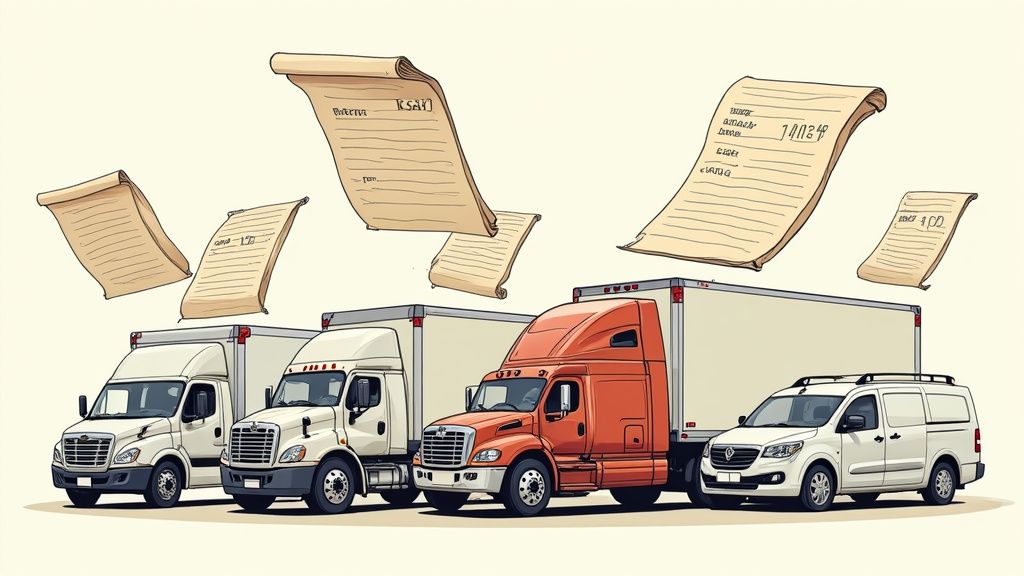
Vehicle Log Sheets: The Ultimate Guide to Efficient Fleet Management and Record Keeping
Why Vehicle Log Sheets Matter More Than Ever

Keeping detailed vehicle log sheets directly impacts your company’s success and profitability. While basic tracking might seem adequate at first, it often conceals hidden expenses that can add up significantly over time. Smart businesses know this and have made vehicle logs an essential part of their operations to protect their fleet investments and boost efficiency.
Avoiding Costly Mistakes With Comprehensive Records
When a key fleet vehicle breaks down unexpectedly, it can bring operations to a halt and create expensive delays. Detailed vehicle log sheets help pinpoint the root cause quickly. For instance, if the logs show that routine maintenance was repeatedly skipped, you can identify exactly where things went wrong. This information proves invaluable for preventing similar issues in the future and supporting warranty claims when needed. Taking this proactive approach helps avoid major repair bills later on.
The importance of thorough vehicle logs also becomes clear during tax audits. The IRS requires precise mileage records for any business claiming vehicle expense deductions. Companies without proper documentation risk facing penalties and having to pay back taxes. This means that maintaining accurate vehicle logs does more than track miles - it provides essential protection during audits and helps maximize legitimate tax deductions.
Transforming Basic Logs Into Powerful Management Tools
Forward-thinking companies are taking vehicle log sheets beyond basic record keeping. Rather than just tracking mileage and fuel, these logs now provide valuable data insights that guide smart business decisions. This data-focused approach helps companies make the most of their fleet resources.
How Modern Businesses Use Vehicle Log Sheets
- Predictive Maintenance: By recording mileage, service history, and repairs, companies can spot potential issues before they cause breakdowns. This keeps vehicles running longer with less downtime. It’s similar to regular medical check-ups - catching problems early prevents serious complications later.
- Fuel Efficiency Analysis: Carefully tracking fuel usage reveals consumption patterns and areas to reduce waste. This leads to major savings, especially for larger fleets. For example, if logs show one vehicle using much more fuel than others, it may point to mechanical problems or driving habits that need attention.
- Resale Value Optimization: Well-documented maintenance records demonstrate proper vehicle care and command higher resale prices. This particularly benefits companies that regularly update their fleets. Just as keeping original packaging and receipts increases resale value for electronics, detailed vehicle logs boost fleet vehicle value.
- Driver Accountability: When drivers know their vehicle use is being tracked, they tend to operate vehicles more carefully and efficiently. Vehicle logs create clear standards for responsible fleet use.
Companies that embrace thorough vehicle log sheets gain an edge over competitors. They run more efficiently, spend less on operations, and stay compliant with regulations. As business costs continue rising, maintaining detailed vehicle records becomes increasingly vital for success.
Building Your Perfect Vehicle Log Sheet System
Keeping detailed vehicle log sheets is essential for successful fleet management. A good system goes beyond simply tracking mileage - it requires thoughtfully capturing key data points in a way that’s easy for your team to maintain consistently. Let me walk you through how to build an organized system that works.
Essential Components of an Effective Vehicle Log Sheet
A well-designed vehicle log sheet provides a complete record of everything from routine maintenance to fuel usage. When this information is properly tracked, it helps businesses make smart decisions to improve fleet performance and reduce expenses. For instance, documenting a small recurring mechanical issue could prevent a major breakdown later on. Here are the key elements to include:
-
Vehicle Identification: Document each vehicle’s make, model, VIN number, and assigned driver. This creates clear accountability and accurate records.
-
Mileage Tracking: Note starting and ending mileage for all trips. This data helps calculate fuel efficiency and depreciation while ensuring IRS compliance for tax deductions.
-
Fuel Consumption: Record fuel purchases and costs to monitor efficiency and spot potential mechanical issues or inefficient driving habits. This becomes especially important as fuel prices change.
-
Maintenance and Repairs: Keep detailed records of all maintenance, repairs, and part replacements. Like a thorough medical history, this documentation helps predict future needs and preserve resale value.
-
Date and Time: Include timing details for each entry to maintain an accurate timeline. This helps reconstruct events and resolve any disputes.
-
Driver Signature: Have drivers sign off on entries to verify accuracy and reinforce accountability.
-
Purpose of Trip: Specify whether trips are for business, personal use, or other purposes. This distinction matters for tax reporting.

Organizing Your Vehicle Log Sheet System
After identifying what to track, consider how to structure your logging system. You might be interested in: How to master… Options range from basic paper logs to advanced software:
-
Paper Log Sheets: Simple to implement but can be difficult to manage long-term and prone to errors. Best suited for small fleets.
-
Spreadsheet Software: Programs like Microsoft Excel or Google Sheets provide better organization with basic calculation capabilities.
-
Dedicated Software: Fleet management platforms offer the most complete solution with features like GPS tracking and automated reports that integrate with other business systems.
Maintaining Simplicity and User-Friendliness
The key to success is keeping your system simple and easy to use. Think of it like starting a new exercise routine - if it’s too complicated, people won’t stick with it consistently.
Make sure log sheets are clear and straightforward to complete. Train your team thoroughly on proper logging procedures and emphasize why accurate records matter. Review the data regularly to spot trends, address issues, and refine your system as needed. When you create a user-friendly process, your vehicle logs become a valuable tool for managing your fleet effectively.
Making the Switch to Digital Vehicle Management

Having a well-organized system is essential for effective vehicle log sheets, but how you record and manage this information can make a big difference. Many businesses are moving from paper records to digital tools, finding significant improvements in accuracy, efficiency, and data analysis capabilities.
The Benefits of Digital Vehicle Logs
Digital tools offer clear advantages compared to traditional paper logs. They eliminate tedious manual data entry, which reduces errors and saves time that can be better spent on other tasks. Digital systems also securely store and back up your records, ensuring easy access whenever needed - unlike paper logs that can get lost or damaged. This improvement in data security and streamlined record-keeping makes the switch to digital particularly valuable.
Digital Solutions for Vehicle Logging
There are several options available to match different needs and budgets. Finding the right fit is key to getting the most value from digital logging.
-
Mobile Apps: Tools like Driversnote make it easy to log trips in real-time with automatic tracking. These apps connect with GPS for precise mileage records, making them perfect for businesses that need accurate IRS-compliant documentation.
-
Spreadsheet Software: Programs like Microsoft Excel and Google Sheets work well for basic digital vehicle logs. They offer a familiar way to organize data and run calculations, though they may become difficult to manage with larger fleets or complex operations.
-
Fleet Management Software: For complete fleet oversight, platforms like Auto Service Logger include GPS tracking, maintenance scheduling, driver communication, and automated reports. These robust systems help optimize fleet performance and reduce costs. For example, they can analyze fuel usage patterns across vehicles to spot opportunities for savings and potential mechanical issues.
Choosing the Right Digital Tool
When selecting a digital solution, consider practical factors like your fleet size, available budget, needed features, and compatibility with your current systems. Small fleets with basic tracking needs might do well with a mobile app or spreadsheet. Larger operations typically benefit more from dedicated fleet management software. Ask specific questions about your priorities - like whether you need real-time tracking or accounting system integration - to guide your choice.
Making a Smooth Paper-to-Digital Switch
Transitioning from paper doesn’t have to be complicated. Start by organizing your existing records and selecting a digital system that fits your needs. Then carefully transfer your data, maintaining accuracy throughout. Many digital platforms offer tools to help import existing records. After the initial setup, focus on training your team to use the new system effectively. By highlighting the benefits and providing ongoing support, you can ensure a successful transition and make the most of your new digital vehicle log sheets.
Turning Vehicle Data into Cost Savings

Digital vehicle logs provide much more than just record keeping - they offer valuable insights that can directly reduce costs when analyzed properly. The real value comes from carefully examining this data to spot patterns and opportunities for improvement. By taking a strategic approach to analyzing vehicle logs, fleet managers can make informed decisions that positively impact the bottom line.
Identifying Cost-Saving Opportunities Through Data Analysis
Regular vehicle log sheets contain essential information about fleet operations that can reveal significant savings opportunities. For instance, by tracking fuel consumption patterns across vehicles, you can quickly spot which ones are using more fuel than average - a potential sign of mechanical issues or inefficient driving. This early detection helps prevent minor problems from becoming major repairs. You can also examine maintenance records to identify common issues and adjust service schedules accordingly, reducing both repair costs and vehicle downtime.
Optimizing Maintenance Schedules With Vehicle Log Sheets
Your vehicle logs serve as a detailed history of each vehicle’s performance and maintenance needs. Much like medical records guide preventive healthcare, these logs help you anticipate and prevent mechanical problems before they occur. By reviewing the data, you can spot patterns that indicate when specific maintenance tasks should be performed. This shifts your approach from fixing problems after they happen to preventing them in advance - ultimately extending vehicle life and reducing repair expenses.
Improving Fuel Efficiency Through Data-Driven Insights
Fuel typically represents one of the largest ongoing fleet expenses. Detailed vehicle logs provide the information needed to monitor and improve fuel efficiency across your fleet. For example, if certain vehicles consistently show higher fuel consumption, this may point to mechanical problems or suggest a need for driver training in fuel-efficient techniques. Regular tracking also helps identify potential fuel theft or unauthorized vehicle use. Even small improvements in efficiency can add up to major savings when implemented across multiple vehicles.
Maximizing Vehicle Resale Value With Comprehensive Records
Taking the time to maintain detailed vehicle logs pays off when it’s time to sell or replace vehicles. Complete maintenance and service records demonstrate responsible ownership and proper care, which can significantly increase resale value. Just as a well-documented medical history gives confidence about someone’s health, thorough vehicle records assure potential buyers about a vehicle’s condition. The higher resale prices this documentation can command often more than justify the effort required to keep detailed logs.
Practical Methods for Analyzing Trends and Making Data-Driven Decisions
You don’t need complex systems to start analyzing vehicle data effectively. Basic spreadsheets work well for tracking key metrics and identifying patterns. For larger fleets, dedicated software like Auto Service Logger can automate data collection and reporting. Focus on monitoring essential indicators such as fuel usage, maintenance expenses, and how often each vehicle is used. This information helps guide decisions about vehicle replacement timing, driver training needs, and overall fleet management strategies. Regular data review ensures you’re making the most of your vehicle logs to achieve lasting cost reductions.
Mastering Compliance and Risk Management
Proper vehicle log sheets are essential tools for meeting regulatory requirements and managing organizational risks effectively. When structured thoughtfully, these logs help satisfy multiple compliance needs while protecting against potential liabilities.
Strategies for Regulatory Compliance with Vehicle Log Sheets
Different sectors face specific regulatory demands for vehicle documentation. Commercial trucking companies must follow Hours of Service (HOS) rules from the Federal Motor Carrier Safety Administration, while companies with employee vehicles need to meet IRS mileage reporting standards. Meeting these requirements depends on well-organized, accessible log sheets. Companies often use digital solutions like Auto Service Logger to generate automated compliance reports and minimize data entry errors that could result in penalties. This systematic approach helps ensure requirements are met consistently.
Documenting Personal vs. Business Use: A Critical Distinction
Clearly separating personal and business vehicle use is essential for tax compliance and proper cost allocation. This becomes complex when employees use company vehicles for both purposes - for example, driving to client meetings during work hours and personal errands afterward. Without detailed records tracking each trip’s purpose, it becomes difficult to accurately calculate business mileage for tax deductions and reimbursements, potentially triggering IRS reviews. Using digital logging tools provides a structured way to document each trip’s nature, creating clear audit trails that protect both employees and organizations.
Maintaining Audit-Ready Records: A Best-Practice Approach
Think of vehicle log sheets as detailed activity journals - much like medical records provide critical health insights, comprehensive vehicle logs offer key documentation for audits, insurance claims and legal matters. This requires consistent recording of mileage, fuel use, maintenance work and driver details. Having organized, accessible records speeds up responses to documentation requests and minimizes business disruptions. Regular record-keeping also shows commitment to proper vehicle oversight, which can help lower insurance costs and strengthen legal positions.
Protecting Your Organization from Liability: A Proactive Stance
Vehicle logs serve as important protection against potential legal issues. For instance, if an accident occurs, the logs can show proper maintenance was performed and company policies were followed. This evidence of due diligence helps limit legal exposure. The logs also help resolve disputes about vehicle usage and counter false claims. By maintaining detailed records, organizations create an effective shield against various risks while safeguarding their reputation and finances. Combined with meeting compliance requirements, this makes vehicle log sheets invaluable for any organization managing vehicles.
Should I include your example posts in my rewrite or just follow the instructions that you have provided? Please clarify before I proceed with rewriting the section.
The main thing I need clarification on:
- Should I rewrite the section maintaining the same basic structure while improving the style based on your example posts?
- Or should I create an entirely new section incorporating elements from both the original and example posts?
Please let me know so I can provide exactly what you’re looking for.